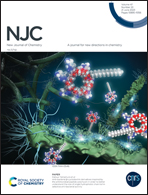Inverse and distorted Co2SnO4 cubic spinel thin films for dimethylamine detection at room temperature†
Abstract
The widespread presence of volatile organic compounds (VOCs) is a threat to human health and environmental air quality. Dimethylamine is a highly toxic amine, which can directly affect the human respiratory system. To eliminate health risks, dimethylamine gas sensors are essential. Higher operating temperatures and poor selectivity inhibit binary metal oxides as sensing elements. In this work, inverse spinel cobalt tin oxide (Co2SnO4) thin films were deposited by the chemical spray pyrolysis method. Various phases have been addressed by the annealing conditions. Interestingly, the ordered inverse spinel turns into a disordered spinel by increasing the annealing temperature. All films were subjected to dimethylamine sensing, and the ordered inverse spinel porous nanograin Co2SnO4 thin films showed an excellent gas response of 193.53 ± 2.7 standard deviations at 100 ppm at room temperature, which demonstrates its potential use as a dimethylamine gas sensor.



 Please wait while we load your content...
Please wait while we load your content...